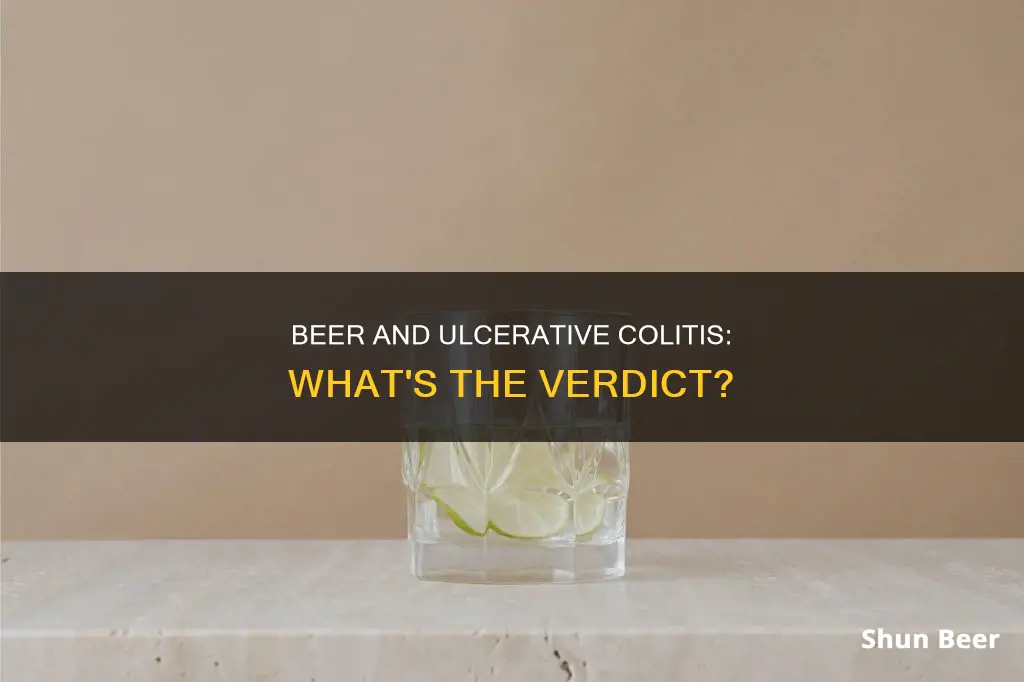
Drinking alcohol is a common concern for people with ulcerative colitis (UC), a type of inflammatory bowel disease (IBD). While alcohol doesn't increase the risk of developing UC, it may worsen symptoms or increase flare-ups. Alcohol irritates the digestive tract, stimulates the intestines, and can cause dehydration and diarrhea—all of which are similar to UC symptoms. It can also negatively impact gut bacteria and increase bowel permeability, which are markers of worsening UC. Additionally, alcohol may interfere with UC medications, reducing their effectiveness or increasing side effects. Some studies suggest that red wine, in moderation, may have anti-inflammatory properties that assist in disease control. However, it can also negatively affect disease monitoring and increase gut permeability, leading to worse intestinal inflammation over time. Overall, while some people with UC may be able to consume alcohol without issues, the general recommendation is to avoid alcoholic beverages to prevent negative outcomes.
| Characteristics | Values |
|---|---|
| Alcohol's impact on the development of ulcerative colitis | There is no clear evidence that alcohol consumption is causally associated with the risk of developing ulcerative colitis. However, early alcohol consumption may be linked to developing the disease later in life. |
| Alcohol's impact on ulcerative colitis symptoms | Alcohol can worsen symptoms of ulcerative colitis, including an increased risk of gut infections, flares, and relapse. Alcohol can also negatively affect the gut microbiome, increase bowel permeability, and irritate the gut lining. |
| Alcohol's impact on ulcerative colitis treatment | Alcohol may interfere with ulcerative colitis medications, reducing their effectiveness or increasing side effects. Alcohol can also interact with painkillers or steroids used to treat flare-ups, increasing the risk of liver damage. |
| Recommended alcohol consumption for people with ulcerative colitis | It is generally recommended that people with ulcerative colitis avoid drinking alcohol, especially during flare-ups. However, tolerances vary, and some people may be able to consume moderate amounts without adverse effects. |
What You'll Learn

Alcohol and gut inflammation
Alcohol can have a detrimental effect on gut inflammation, particularly for those suffering from inflammatory bowel diseases such as ulcerative colitis (UC). Alcohol is a diuretic, which means it dehydrates the body and stimulates the bowels, often worsening diarrhoea. It can also cause bleeding in the gut and irritate and inflame the gut lining, which is responsible for keeping toxins out and absorbing nutrients into the bloodstream.
Alcohol and the Gut Microbiome
Alcohol can negatively impact the gut microbiome, increasing the risk of bacteria invasion. It can disrupt the amount, diversity, and balance of healthy bacteria in the intestines, with alcohol-induced dysbiosis providing opportunities for pathogenic bacteria, such as Clostridioides difficile, to colonise and proliferate.
Alcohol and the Development of Inflammatory Bowel Disease
While there is no clear evidence that alcohol consumption is causally associated with the risk of inflammatory bowel disease, early alcohol use may be linked to developing such diseases later in life. Alcohol may modulate the microbiome and facilitate intestinal inflammation, and patients with alcohol abuse disorder have been found to have a similar microbial signature to those with inflammatory bowel disease.
Alcohol and Relapse
Prospective research has reported that alcohol use is associated with a higher risk of relapse in patients with UC. Alcohol can negatively impact the protective molecules in the gut and increase bowel permeability, both markers of worsening UC. Alcohol can also aggravate inflammatory responses in the gut, and consumption is linked to an increased risk of intestinal infections.
Alcohol and Medication
Alcohol can interfere with the metabolism of several medications used to treat inflammatory bowel disease, including antibiotics, 5-aminosalicylates, immunosuppressants, and biologics. It can delay the breakdown of medications or accelerate their metabolism, and it may also decrease their efficacy. Alcohol can also increase the likelihood of adverse reactions and side effects.
Alcohol and Liver Damage
Chronic alcohol use may lead to liver disease and liver damage. Alcohol consumption is linked to a higher risk of chronic liver injury and liver failure due to a buildup of toxins that damage the gut and liver lining.
Alcohol and Quality of Life
While alcohol can cause harmful side effects, it is also an important part of life for many people. Deciding whether to give up alcohol for health reasons can be challenging, and it is important to consider quality of life as well as potential health risks.
Concussion and Alcohol: A Risky Mix?
You may want to see also

Alcohol and gut bacteria
Firstly, alcohol can make the intestinal lining more permeable, allowing bacteria and toxins to leak into the bloodstream and triggering an inflammatory response in the body. This inflammatory response can then contribute to organ damage, including in the liver and brain. Alcohol also affects the diversity and balance of gut bacteria, reducing the number of beneficial bacteria and promoting the growth of pathogenic bacteria. This alteration in the gut microbiome has been linked to an increased risk of intestinal inflammation and disorders such as inflammatory bowel disease and alcoholic liver disease.
Additionally, alcohol can interfere with the body's ability to absorb nutrients and may also impact the effectiveness of certain medications, including those prescribed for ulcerative colitis. It is worth noting that the impact of alcohol on the gut may depend on the type of alcoholic beverage consumed. For example, red wine has been associated with an increase in anti-inflammatory bacterial groups, whereas other alcoholic drinks can increase pro-inflammatory species. However, it is important to note that recent data suggests that there may be no entirely safe amount of alcohol, including red wine.
Overall, the relationship between alcohol and gut bacteria is complex and still not fully understood. While moderate consumption of certain alcoholic beverages may have some potential benefits, heavy drinking is generally associated with negative consequences for gut health and should be avoided.
Beer and Comal River: What You Should Know
You may want to see also

Alcohol and medication interference
Alcohol consumption can negatively affect how ulcerative colitis (UC) medication functions and can contribute to increased side effects. It can also lead to liver damage and complications.
Alcohol is broken down in the liver by enzymes, particularly cytochrome P450. Heavy alcohol consumption increases the activity of these enzymes, which can affect how medications are metabolised. This can result in delayed breakdown of medications or accelerated metabolism in the absence of alcohol.
Several medications used to treat UC have the potential to interact with alcohol, including antibiotics, 5-aminosalicylates, immunosuppressants (e.g. methotrexate and thiopurine), and biologics. For example, if you are taking metronidazole, you should avoid alcohol while using it and for at least two days after your last dose. Alcohol can also decrease the levels of circulating cyclosporine, often used as salvage therapy in patients with acute severe UC.
Additionally, the consumption of alcohol with methotrexate and azathioprine can increase the risk of liver damage and should be avoided. Alcohol can also negatively impact the gut microbiome, affecting protective molecules in the gut and increasing bowel permeability, which are markers of worsening UC.
It is important to consult with a doctor or pharmacist about the safety of alcohol consumption while taking any medications to prevent potential harmful reactions and worsening symptoms.
Beer and Mucinex: Safe Mix or Health Risk?
You may want to see also

Alcohol and liver damage
Alcohol-related liver disease (ARLD) is caused by excess alcohol intake. The liver is a complex organ with many functions, including filtering toxins from the blood, aiding digestion, and regulating blood sugar and cholesterol levels. Each time the liver filters alcohol, some of its cells die, and prolonged alcohol misuse can reduce its ability to regenerate, leading to serious and permanent liver damage.
There are three main types of ARLD:
- Steatotic (fatty) liver: This is the most common alcohol-induced liver problem, characterised by a build-up of fat inside the liver cells, leading to an enlarged liver.
- Acute hepatitis: Alcohol-associated hepatitis is an acute inflammation of the liver, resulting in liver cell death and permanent scarring.
- Cirrhosis: Alcohol-associated cirrhosis is the destruction of normal liver tissue, leaving scar tissue in its place. This can cause the liver to stop functioning correctly.
The effects of alcohol on the liver depend on the amount consumed and the duration of alcohol use. Heavy alcohol use is defined as consuming more than the liver can process. For men, this means more than five drinks on any day or 15 or more drinks per week. For women, it is defined as more than four drinks on any day or eight or more drinks per week.
The symptoms of ARLD may vary depending on the type and severity of the disease. In the early stages, there may be no symptoms at all. However, as the disease progresses, possible symptoms include:
- Poor appetite and weight loss
- Small, red spider-like blood vessels on the skin
- Fluid buildup in the legs (edema) and abdomen (ascites)
- Jaundice (yellowing of the skin, mucous membranes, or eyes)
- Redness on the palms of the hands
- In men, impotence, shrinking of the testicles, and breast swelling
- Easy bruising and abnormal bleeding
- Confusion or problems with thinking
- Pale or clay-coloured stools
- Bleeding in the gastrointestinal tract
If left untreated, ARLD can lead to serious and potentially life-threatening complications, including:
- Internal bleeding (variceal bleeding)
- Buildup of toxins in the brain (encephalopathy)
- Ascites with associated kidney failure
- Increased vulnerability to infection
- Kidney problems
- Gastrointestinal bleeding
- Mental confusion, changes in consciousness, or coma (hepatic encephalopathy)
The treatment for ARLD primarily involves stopping alcohol consumption, preferably for life. This allows the liver to recover and reduces the risk of further damage. In severe cases, a liver transplant may be required if the liver has stopped functioning and does not improve with abstinence from alcohol.
In summary, alcohol-related liver damage is a serious condition that can have life-threatening consequences. The best way to prevent ARLD is to avoid excessive alcohol intake or drink within the recommended limits. If you regularly drink alcohol to excess, it is important to seek medical advice to check for liver damage and take steps to reduce your alcohol consumption to prevent further harm to your liver.
Beer and Acetaminophen: A Safe Mix?
You may want to see also

Alcohol and gut permeability
Alcohol consumption can have a detrimental effect on the gut, increasing intestinal permeability and causing bacterial overgrowth.
Alcohol and Intestinal Permeability
Alcohol can increase intestinal permeability, allowing pathogens and other harmful substances to enter the bloodstream. This is caused by alcohol disrupting the epithelial cells themselves (transepithelial permeability) and the spaces between the epithelial cells (paracellular permeability).
Alcohol and Bacterial Overgrowth
Alcohol can also cause bacterial overgrowth in the intestine, which may be stimulated directly by alcohol, or as an indirect result of poor digestive and intestinal function caused by alcohol consumption. Alcohol can alter bile-acid metabolism, and in turn, bile acids can affect intestinal bacteria.
Alcohol and Ulcerative Colitis
Alcohol does not cause ulcerative colitis, but drinking alcohol can still have negative effects on the condition and worsen symptoms. Alcohol can cause gut infections, flares, and a future relapse of ulcerative colitis. It can also irritate and inflame the gut lining, which helps keep toxins out and absorb nutrients into the bloodstream.
The Science of Nostalgia: Beer Cooler Edition
You may want to see also
Frequently asked questions
Beer is a carbonated alcoholic drink, and carbonation can cause gas. Alcohol also stimulates the bowels and can worsen diarrhoea. Beer also contains sulfites, which have been linked to an increased risk of disease activity or relapse in people with ulcerative colitis. It is best to avoid drinking beer if you have ulcerative colitis.
Alcoholic drinks with a high sugar concentration could be more likely to cause symptoms. It may be best to avoid cocktails, sweet drinks, and drinks with high-sugar mixers such as margaritas. If you want to drink alcohol, it is recommended to stick to clear liquor, ice, and club soda. However, it is important to note that there is no entirely safe amount of alcohol for people with ulcerative colitis.
Drinking alcohol can worsen symptoms of ulcerative colitis, increase the risk of relapse, and negatively affect medications. Alcohol can irritate the gut and cause inflammation, harm the gut barrier, and increase the risk of bacterial invasion. It can also affect the gut microbiome, negatively impact protective molecules in the gut, and increase bowel permeability.







